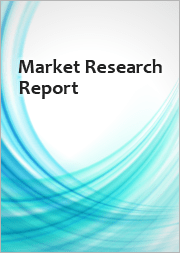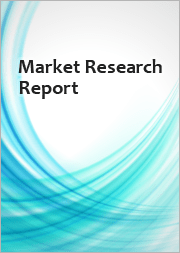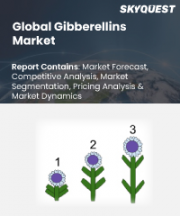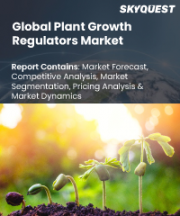
|
시장보고서
상품코드
1897961
식물 성장 조절제 시장 : 시장 규모, 점유율 및 성장 분석 - 작물 유형별, 용도별, 제품 유형별, 기능별, 제제별, 지역별 업계 예측(2026-2033년)Plant Growth Regulators Market Size, Share, and Growth Analysis, By Crop Type (Cereals and Grains, Pulses And Oilseeds), By Application (Fertigation, Foliar), By Product Type, By Function, By Formulation, By Region - Industry Forecast 2026-2033 |
||||||
세계의 식물 성장 조절제 시장 규모는 2024년 57억 5,000만 달러로 평가되었고, 2025년 63억 6,000만 달러에서 2033년까지 142억 4,000만 달러로 성장할 전망입니다. 예측 기간(2026-2033년) CAGR은 10.6%로 성장이 예측되고 있습니다.
식물 성장 조절제는 식물의 다양한 성장 및 발달 과정에 영향을 미치는 중요한 화학제품입니다. 농업 부문에서 널리 사용되는 이러한 조정제(합성 및 천연에 관계없이)는 작물의 수율 및 품질 향상과 성장 관리를 촉진합니다. 그 용도는 종자, 잎, 뿌리까지 성장의 촉진 및 억제, 결실의 촉진, 스트레스 내성의 향상을 가능하게 합니다. 현대 농업에서 중요한 도구로서 생산성 극대화와 환경 부하의 저감을 농업 종사자들에게 지원합니다. 아시아태평양은 식량 수요 증가와 첨단 농업 기법 도입을 바탕으로 현저한 성장이 예상됩니다. 경쟁 구도에서는 수많은 기업들이 제품 라인 확충과 신흥 시장에서의 존재감 강화에 주력하고 있습니다.
세계의 식물 성장 조절제 시장 성장 촉진요인
식물 성장 조절제 시장을 견인하는 중요한 요인은 세계 인구 증가에 따른 식량 수요 증가입니다. 지구에 사는 사람들이 늘어남에 따라 식량 생산량 증가가 시급해지고, 작물의 수율과 품질을 향상시키는 고도의 농업 수법의 도입이 촉진되고 있습니다. 식물 성장 조절제는 식물 성장 촉진, 수율 향상, 해충 및 질병으로부터의 작물 보호에 중요한 역할을 합니다. 이 중요한 지원은 농업 종사자들이 급증하는 식량 수요에 효과적으로 대응할 수 있게 하고, 궁극적으로 지속가능한 농업용 혁신적인 솔루션을 추구하는 이해관계자들이 늘어나면서 식물 성장 조절제 시장의 성장을 가속합니다.
세계의 식물 성장 조절제 시장 성장 억제요인
세계의 식물 성장 조절제 시장이 직면한 주요 과제는 농업 부문에서의 사용과 관련하여 정부 기관이 시행하는 엄격한 규제입니다. 이러한 규제는 환경에 대한 악영향을 최소화하면서 작물과 소비자 모두를 보호하기 위한 것입니다. 이러한 엄격한 지침은 식물 성장 조절제의 보급을 방해하고 시장 확대를 방해할 수 있습니다. 또한 이러한 제품과 관련된 높은 비용도 시장 성장을 방해하는 요인이 될 수 있습니다. 특히 소규모 농업 종사자에게는 경제적으로 부담이 큰 경우가 있습니다. 그 결과 규제 제약과 재정 제약 모두 시장의 진전 및 보급에 큰 장벽이 되었습니다.
세계의 식물 성장 조절제 시장 동향
세계의 식물 성장 조절제 시장에서 현저한 동향으로는 건강 지향적이고 친환경 식품을 요구하는 소비자 수요에 힘입어 지속가능한 농업에 대한 중시가 높아지고 있습니다. 유기 농업의 실천이 보급됨에 따라 해초 추출물 및 유익한 미생물 등 천연유래의 식물 성장 조절제의 이용으로 현저한 전환이 보입니다. 이 전환은 생태계의 균형을 유지하면서 작물의 수율과 품질을 향상시킬 필요성에 의해 촉진되고 있습니다. 또한 제품 배합의 혁신과 천연 유래의 성장 촉진제에 대한 규제면의 지원 강화가 함께 현대농업에 이러한 친환경 솔루션의 도입을 더욱 추진하고 있습니다.
자주 묻는 질문
목차
서문
- 조사 목적
- 조사 범위
- 정의
조사 방법
- 정보 조달
- 1차 및 2차 데이터의 방법
- 시장 규모 예측
- 시장의 전제조건 및 제한
주요 요약
- 세계 시장 전망
- 공급 및 수요 동향 분석
- 부문별 기회 분석
시장 역학 및 전망
- 시장 규모
- 시장 역학
- 성장 촉진요인 및 기회
- 성장 억제요인 및 과제
- Porter's Five Forces 분석
주요 시장 인사이트
- 중요 성공 요인
- 경쟁도
- 주요 투자 기회
- 시장 생태계
- 시장의 매력 지수(2025년)
- PESTEL 분석
- 거시경제지표
- 밸류체인 분석
- 가격 분석
세계의 식물 성장 조절제 시장 규모 : 작물 유형별 CAGR(2026-2033년)
- 곡류 및 곡물
- 옥수수
- 밀
- 쌀
- 기타
- 콩류 및 지방종자
- 면실
- 콩
- 해바라기
- 기타
- 과일 및 야채
- 잔디 및 관상 식물
세계의 식물 성장 조절제 시장 규모 : 용도별 CAGR(2026-2033년)
- 시비 관개
- 잎면 살포
세계의 식물 성장 조절제 시장 규모 : 제품 유형별 CAGR(2026-2033년)
- 사이토카이닌
- 옥신
- 지베렐린
- 에틸렌
- 기타
세계의 식물 성장 조절제 시장 규모 : 기능별 CAGR(2026-2033년)
- 식물 성장 억제제
- 식물 성장 촉진제
세계의 식물 성장 조절제 시장 규모 : 제제별 CAGR(2026-2033년)
- 수분산성과 수용성 과립제
- 수화제
- 용액
세계의 식물 성장 조절제 시장 규모 및 CAGR(2026-2033년)
- 북미
- 미국
- 캐나다
- 유럽
- 독일
- 스페인
- 프랑스
- 영국
- 이탈리아
- 기타 유럽
- 아시아태평양
- 중국
- 인도
- 일본
- 한국
- 기타 아시아태평양
- 라틴아메리카
- 브라질
- 기타 라틴아메리카
- 중동 및 아프리카
- GCC
- 남아프리카
- 기타 중동 및 아프리카
경쟁 정보
- 상위 5개사 비교
- 주요 기업의 시장 포지셔닝(2025년)
- 주요 시장 기업이 채용한 전략
- 최근 시장 동향
- 기업의 시장 점유율 분석(2025년)
- 주요 기업의 기업 프로파일
- 기업의 상세
- 제품 포트폴리오 분석
- 기업의 부문별 점유율 분석
- 수익의 전년대비 비교(2023-2025년)
주요 기업 프로파일
- BASF SE(Germany)
- Bayer AG(Germany)
- Corteva Agriscience(United States)
- Syngenta Group(Switzerland)
- FMC Corporation(United States)
- Nufarm(Australia)
- Tata Chemicals Ltd.(India)
- UPL Limited(India)
- Sumitomo Chemical Co., Ltd.(Japan)
- Nippon Soda Co., Ltd.(Japan)
- Sipcam Oxon Spa(Italy)
- De Sangosse(France)
- Dhanuka Agritech Ltd.(India)
- Sichuan Guoguang Agrochemical Co., Ltd.(China)
- Zagro(Singapore)
- Valent BioSciences LLC(United States)
- Adama Agricultural Solutions Ltd.(Israel)
- Arysta LifeScience Corporation(United States)
- WinField Solutions LLC(United States)
- Rotam CropSciences Ltd.(Hong Kong)
결론 및 권고
AJY 26.01.14Global Plant Growth Regulators Market size was valued at USD 5.75 Billion in 2024 and is poised to grow from USD 6.36 Billion in 2025 to USD 14.24 Billion by 2033, growing at a CAGR of 10.6% during the forecast period (2026-2033).
Plant growth regulators are essential chemical compounds that influence various growth and developmental processes in plants. Widely utilized in agriculture, these regulators, both synthetic and natural, enhance crop yield, quality, and growth management. Their applications extend to seeds, foliage, and roots, enabling the stimulation or inhibition of growth, promotion of fruiting, and improvement of stress tolerance. As a critical tool in modern agricultural practices, they assist farmers in maximizing production while minimizing environmental impact. The Asia Pacific region is poised for significant growth, fueled by rising food demand and the integration of advanced agricultural methodologies. The competitive landscape features numerous players focused on expanding their product offerings and enhancing their presence in emerging markets.
Top-down and bottom-up approaches were used to estimate and validate the size of the Global Plant Growth Regulators market and to estimate the size of various other dependent submarkets. The research methodology used to estimate the market size includes the following details: The key players in the market were identified through secondary research, and their market shares in the respective regions were determined through primary and secondary research. This entire procedure includes the study of the annual and financial reports of the top market players and extensive interviews for key insights from industry leaders such as CEOs, VPs, directors, and marketing executives. All percentage shares split, and breakdowns were determined using secondary sources and verified through Primary sources. All possible parameters that affect the markets covered in this research study have been accounted for, viewed in extensive detail, verified through primary research, and analyzed to get the final quantitative and qualitative data.
Global Plant Growth Regulators Market Segments Analysis
Global Plant Growth Regulators Market is segmented by Crop Type, Application, Product Type, Function, Formulation and region. Based on Crop Type, the market is segmented into Cereals and Grains, Pulses And Oilseeds, Fruits & Vegetables and Turf & Ornamentals. Based on Application, the market is segmented into Fertigation and Foliar. Based on Product Type, the market is segmented into Cytokinin, Auxins, Gibberellins, Ethylene and Others. Based on Function, the market is segmented into Plant Growth Inhibitors and Plant Growth Promoters. Based on Formulation, the market is segmented into Water Dispersible and Water-Soluble Granules, Wettable Powder and Solutions. Based on region, the market is segmented into North America, Europe, Asia Pacific, Latin America and Middle East & Africa.
Driver of the Global Plant Growth Regulators Market
A significant factor propelling the plant growth regulators market is the escalating demand for food arising from the expanding global population. As more people inhabit the earth, the necessity for increased food production intensifies, prompting the adoption of advanced agricultural methods designed to boost crop yields and quality. Plant growth regulators play a crucial role in this sector by promoting plant growth, enhancing yields, and safeguarding crops against pests and diseases. This vital support enables farmers to effectively address the surging food demand, ultimately fostering growth within the plant growth regulators market as stakeholders seek innovative solutions for sustainable agriculture.
Restraints in the Global Plant Growth Regulators Market
A significant challenge faced by the global plant growth regulators market is the strict regulations enforced by government agencies regarding their usage in agriculture. These regulations aim to safeguard both crops and consumers while minimizing environmental harm. Such stringent guidelines can hinder the widespread adoption of plant growth regulators, potentially stifering market expansion. Additionally, the high costs associated with these products can further impede market growth, particularly as they may be financially prohibitive for small-scale farmers. Consequently, both regulatory constraints and financial limitations pose considerable obstacles to the market's advancement and accessibility.
Market Trends of the Global Plant Growth Regulators Market
A notable trend in the global plant growth regulators market is the heightened emphasis on sustainable agriculture, driven by consumer demand for health-conscious and environmentally friendly food options. As organic farming practices gain traction, there is a marked shift toward utilizing plant growth regulators sourced from natural origins, such as seaweed extracts and beneficial microbes. This transition is fueled by the necessity to enhance crop yield and quality while maintaining ecological balance. Furthermore, innovations in product formulation and increasing regulatory support for natural growth enhancers are further propelling the adoption of these eco-friendly solutions within modern agricultural practices.
Table of Contents
Introduction
- Objectives of the Study
- Scope of the Report
- Definitions
Research Methodology
- Information Procurement
- Secondary & Primary Data Methods
- Market Size Estimation
- Market Assumptions & Limitations
Executive Summary
- Global Market Outlook
- Supply & Demand Trend Analysis
- Segmental Opportunity Analysis
Market Dynamics & Outlook
- Market Overview
- Market Size
- Market Dynamics
- Drivers & Opportunities
- Restraints & Challenges
- Porters Analysis
- Competitive rivalry
- Threat of substitute
- Bargaining power of buyers
- Threat of new entrants
- Bargaining power of suppliers
Key Market Insights
- Key Success Factors
- Degree of Competition
- Top Investment Pockets
- Market Ecosystem
- Market Attractiveness Index, 2025
- PESTEL Analysis
- Macro-Economic Indicators
- Value Chain Analysis
- Pricing Analysis
Global Plant Growth Regulators Market Size by Crop Type & CAGR (2026-2033)
- Market Overview
- Cereals and Grains
- Corn
- Wheat
- Rice
- Others
- Pulses And Oilseeds
- Cotton Seeds
- Soyabean
- Sunflower
- Others
- Fruits & Vegetables
- Turf & Ornamentals
Global Plant Growth Regulators Market Size by Application & CAGR (2026-2033)
- Market Overview
- Fertigation
- Foliar
Global Plant Growth Regulators Market Size by Product Type & CAGR (2026-2033)
- Market Overview
- Cytokinin
- Auxins
- Gibberellins
- Ethylene
- Others
Global Plant Growth Regulators Market Size by Function & CAGR (2026-2033)
- Market Overview
- Plant Growth Inhibitors
- Plant Growth Promoters
Global Plant Growth Regulators Market Size by Formulation & CAGR (2026-2033)
- Market Overview
- Water Dispersible and Water-Soluble Granules
- Wettable Powder
- Solutions
Global Plant Growth Regulators Market Size & CAGR (2026-2033)
- North America (Crop Type, Application, Product Type, Function, Formulation)
- US
- Canada
- Europe (Crop Type, Application, Product Type, Function, Formulation)
- Germany
- Spain
- France
- UK
- Italy
- Rest of Europe
- Asia Pacific (Crop Type, Application, Product Type, Function, Formulation)
- China
- India
- Japan
- South Korea
- Rest of Asia-Pacific
- Latin America (Crop Type, Application, Product Type, Function, Formulation)
- Brazil
- Rest of Latin America
- Middle East & Africa (Crop Type, Application, Product Type, Function, Formulation)
- GCC Countries
- South Africa
- Rest of Middle East & Africa
Competitive Intelligence
- Top 5 Player Comparison
- Market Positioning of Key Players, 2025
- Strategies Adopted by Key Market Players
- Recent Developments in the Market
- Company Market Share Analysis, 2025
- Company Profiles of All Key Players
- Company Details
- Product Portfolio Analysis
- Company's Segmental Share Analysis
- Revenue Y-O-Y Comparison (2023-2025)
Key Company Profiles
- BASF SE (Germany)
- Company Overview
- Business Segment Overview
- Financial Updates
- Key Developments
- Bayer AG (Germany)
- Company Overview
- Business Segment Overview
- Financial Updates
- Key Developments
- Corteva Agriscience (USA)
- Company Overview
- Business Segment Overview
- Financial Updates
- Key Developments
- Syngenta Group (Switzerland)
- Company Overview
- Business Segment Overview
- Financial Updates
- Key Developments
- FMC Corporation (USA)
- Company Overview
- Business Segment Overview
- Financial Updates
- Key Developments
- Nufarm (Australia)
- Company Overview
- Business Segment Overview
- Financial Updates
- Key Developments
- Tata Chemicals Ltd. (India)
- Company Overview
- Business Segment Overview
- Financial Updates
- Key Developments
- UPL Limited (India)
- Company Overview
- Business Segment Overview
- Financial Updates
- Key Developments
- Sumitomo Chemical Co., Ltd. (Japan)
- Company Overview
- Business Segment Overview
- Financial Updates
- Key Developments
- Nippon Soda Co., Ltd. (Japan)
- Company Overview
- Business Segment Overview
- Financial Updates
- Key Developments
- Sipcam Oxon Spa (Italy)
- Company Overview
- Business Segment Overview
- Financial Updates
- Key Developments
- De Sangosse (France)
- Company Overview
- Business Segment Overview
- Financial Updates
- Key Developments
- Dhanuka Agritech Ltd. (India)
- Company Overview
- Business Segment Overview
- Financial Updates
- Key Developments
- Sichuan Guoguang Agrochemical Co., Ltd. (China)
- Company Overview
- Business Segment Overview
- Financial Updates
- Key Developments
- Zagro (Singapore)
- Company Overview
- Business Segment Overview
- Financial Updates
- Key Developments
- Valent BioSciences LLC (USA)
- Company Overview
- Business Segment Overview
- Financial Updates
- Key Developments
- Adama Agricultural Solutions Ltd. (Israel)
- Company Overview
- Business Segment Overview
- Financial Updates
- Key Developments
- Arysta LifeScience Corporation (USA)
- Company Overview
- Business Segment Overview
- Financial Updates
- Key Developments
- WinField Solutions LLC (USA)
- Company Overview
- Business Segment Overview
- Financial Updates
- Key Developments
- Rotam CropSciences Ltd. (Hong Kong)
- Company Overview
- Business Segment Overview
- Financial Updates
- Key Developments






